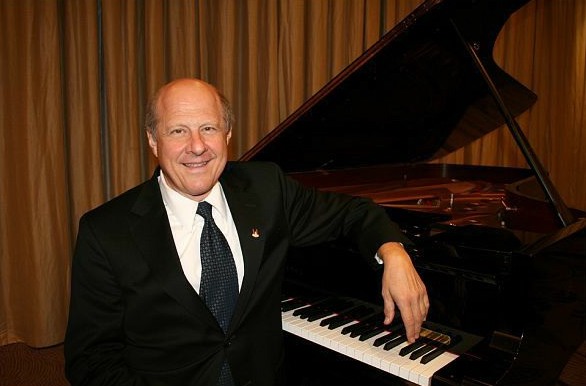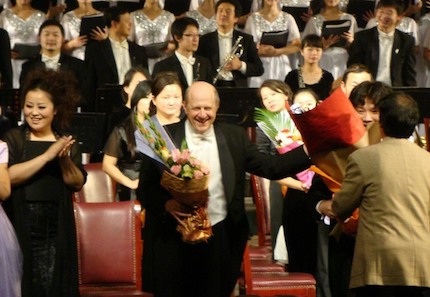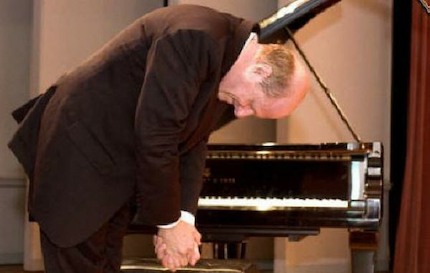Pianist Sam Rotman shares about his conversion to the Christian faith in his concerts. “I want to reach people for Christ by playing classical music”.
 Sam Rotman.
Sam Rotman.
Sam Rotman is a concert pianist with several international awards, four albums and an extensive professional career.
He has recently toured Spain, presenting a repertoire of works by Beethoven, Mozart and other classical composers.
In his concerts, Rotman also tells the story of his life: how he was raised in an Orthodox Jewish family that came to the United States fleeing Nazi repression in mid-twentieth-century Europe, and developed a musical career with effort and perseverance.
He also shares how his life changed in 1971, when he received a New Testament and discovered the person of Jesus.
In an interview with Spanish news website Protestante Digital, Rotman explained how he shares with big audiences the beauty of classical music, and the beauty of God in his personal story.
Question. How did your passion for music start?
Answer. My mother was born in Slovakia, and she loved classical music. When I was six year-old, he took me to concerts.
She never asked me to play, but when I was nine years old, I told my parents that I wanted to play the piano. I really liked it. I was not like a prodigy, but the more I practiced, the better I realised I could play.
Then, when I was 11 years old I remember I made a real decision that I wanted to be a concert pianist.
I began to practice much more: a couple of hours a day, then three, then four. I won some competitions, and when I was 16 I won an important competition, playing with a big orchestra before around 6,000 people.
At the age of 17, I was accepted at the famous Juliard Music School, practicing 10 hours a day. And there I got 2 degrees.
So my mother was the one who introduced me to music, and then many teachers have influenced me to love this art.
Q. Some believe that, in order to become a professional musician, one needs to start even earlier.
A. Parents can start when they see that their children have an interest, but I believe the best age is 6 for girls and 7 for boys, whenever they can read.
This makes it easier for them to learn to read music. When they are younger, they just play by imitation.
 Sam Rotman in a concert in China. / Sam Rotman website
Sam Rotman in a concert in China. / Sam Rotman website
Q. Do you think that being a pianist has been a good way to grow as a person?
A. Yes, but it takes work. Sometimes I practiced 12 hours a day. Now that I am creating new music, 7 hours a day. The point is that for me this is not a job, it is a passion.
When you find what is exciting for you, whether it's playing an instrument, or teaching, or maths, or carpentry, you work for it and you become good at it, so that it's a satisfying thing.
I am 68 years old, and I have given more than 3,000 concerts in 61 countries. People ask me when I am going to retire, but I tell them that this my passion.
I do not work from 9 to 5 and then I turn it off. It's my world, and when I go to sleep, I keep thinking about the music and listening to it in my head.
It is a very competitive context, the audience of classical music is smaller than in popular music. But I love music, how it makes you cry, it is very powerful. I play for God.
Playing music has allowed me to share my testimony, because if I played Christian music, only Christians would come, but Jewish people and people from other faiths will come to listen to Beethoven or Mozart.
I want to reach people for Christ by playing classical music. The Lord opens doors and I walk through them.
Q. So do you think music can help people to connect with God?
A. Music expresses our emotions in ways that words cannot. I always say that animals do not compose or play the piano. We are the ones who create music - we invented the piano.
There is something in us, the Almighty. I could play classical music in front of animals in a zoo, but they would not clap, cry or want my autograph.
It is like what the Bible says in Romans 1, that Creation shows us that there is a God. Music shows us that there is a talent, a gift that God has given to us humans.
Furthermore, in my case, I share my testimony to explain specifically what God has done for us, sending His Son Jesus, bringing us salvation. I always say: not one note of music will ever change me, but Jesus changes me. He changed my heart, my life, He cleansed me and saved me.
So in my concerts I usually play for around an hour, and then I explain what God has done in my life. I explain that music is not the most important thing in my life, Jesus is the most important thing. Because beyond music, there is the God of creation and salvation.
Q. You were raised in a Jewish family, how did you get to know Jesus?
A. My parent are Orthodox Jews, very strict. I went to public school and then I went to a school in synagogue called Hebrew school and I was very.
But since I was 9 or 10, I realised I could swear very easily, or lie to my teacher, so I was very religious when I had to and very un-religious when I wanted.
 Rotman after a concert in Cork, Ireland. /Sam Rotman website
Rotman after a concert in Cork, Ireland. /Sam Rotman websiteIn Juliard, I saw three students who were always reading the Bible. They were very talented, high-respected students, and when they were together, they always talked about Jesus.
They heard I was a Jew and asked me if I have read the New Testament. I had never read it. As I said, I was very moral, I had never drunk alcohol, tried drugs, had sex, etc, but I knew that I was not in the inside the way it appeared in the outside.
With them, I began to read the New Testament in the Gospel of John. It was shocking for me, I was surprised by the words of Jesus.
I thought Jesus was crazy, that what he said about himself was not normal. But then I realised He was talking about a change from the inside.
There is a very powerful verse in the the Gospel of Mark, which says that out of the heart of man, comes murder, stealing, adultery. I though those were things we do, but Jesus said that before you ever do them, they are inside you. I realised I was doing that.
Then, on May 21, 1971, I prayed for the first time to God in the name of Jesus, recognizing that I needed him in my life, to cleanse my heart, my mind, my mouth.
I opened my eyes and I knew Jesus has completely changed me. I could not wait to tell my Jewish friends that I met Jesus. A few days later, I started to go to a Baptist church. For me it was like going from darkness to light, from death to life, from sin to salvation.
Q. Since then, you have traveled all around the world giving concerts and sharing your testimony. How did you start?
A. A church invited me to play at an event, and also to share my testimony. They really liked it and I realised it was a good opportunity to share the gospel.
Suddenly, I got invited here and there. People enjoyed a classical music concert, and then I can shared briefly what is most important in my life.
Q. Now you are on tour. How does the audience react?
A. I stand up and tell them that I play for Jesus. I try to play on the highest level, so that I earn a little bit the right to tell you my story about what Jesus has donde for me.
People have been very moved. I have seen many people come to the Lord. You do your best, you pray, and God takes care of the rest.
We just want people to experience the transformation that Jesus brings to life. It is worth living for Him.

Las opiniones vertidas por nuestros colaboradores se realizan a nivel personal, pudiendo coincidir o no con la postura de la dirección de Protestante Digital.
Si quieres comentar o